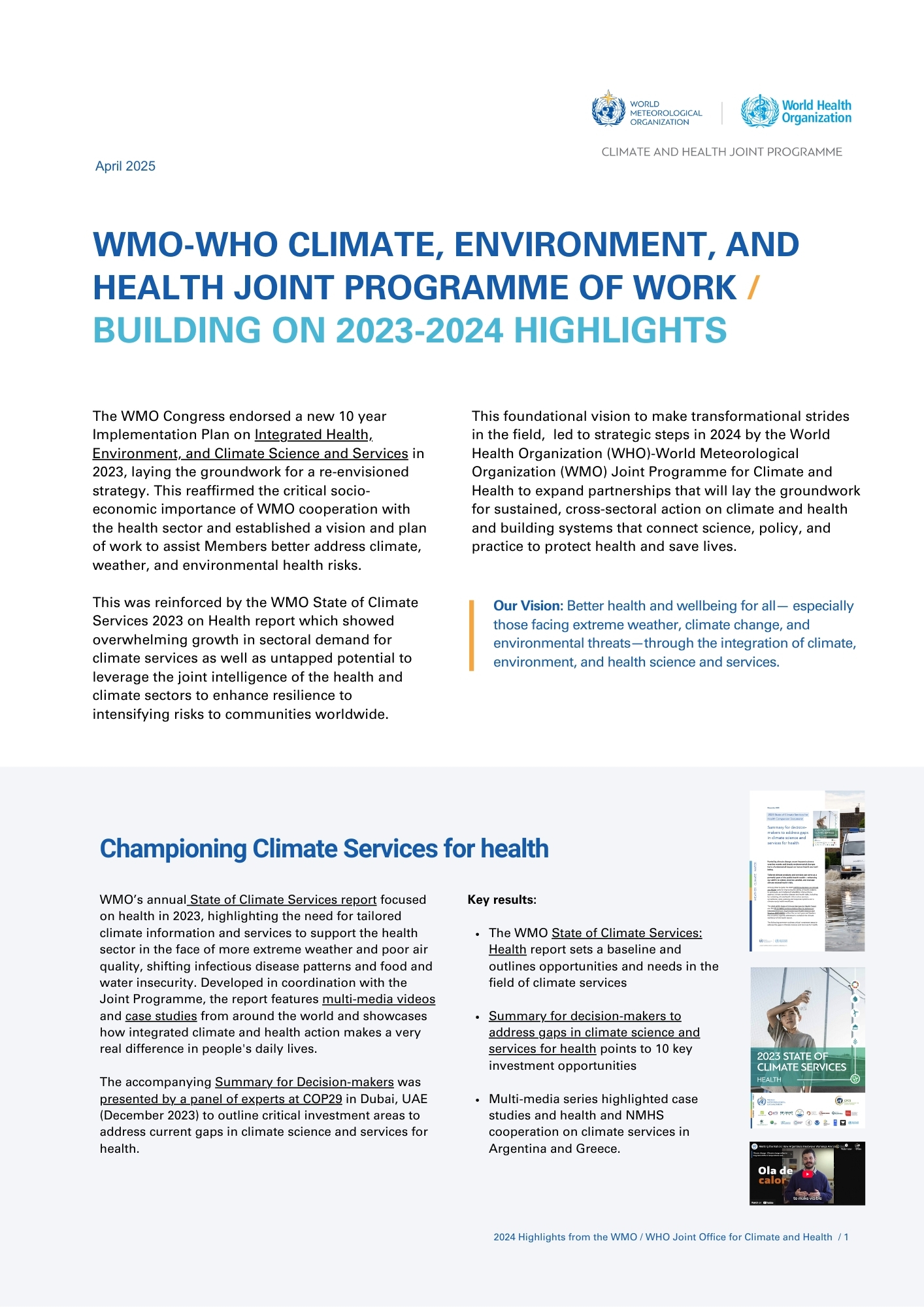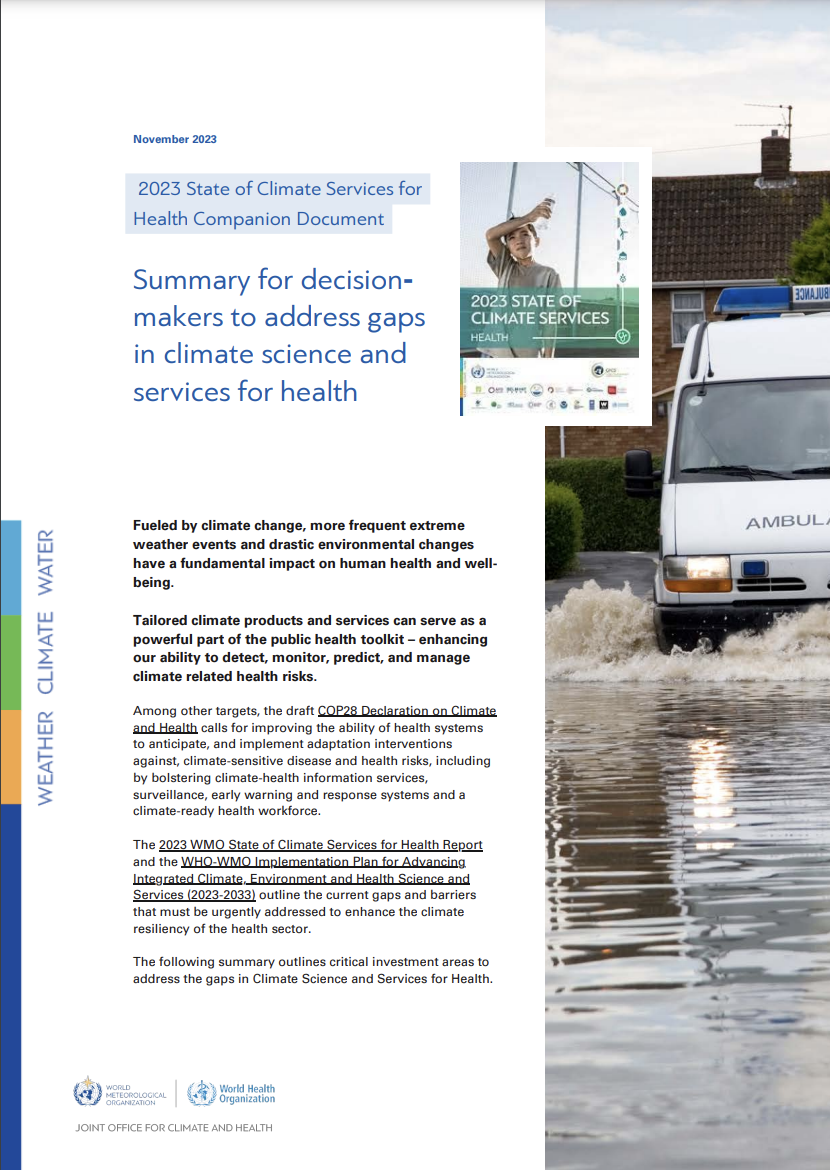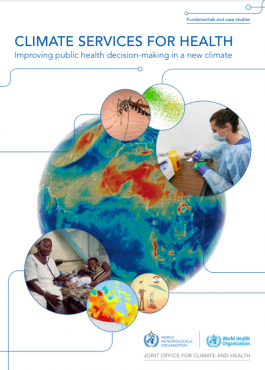
PUBLICATION
Building on 2023-2024 highlights: WMO-WHO Climate, Environment, and Health Joint Programme of Work
2025

Climate change, extreme weather, air and water pollution, and other environmental risks are growing health threats. The World Meteorological Organization (WMO) and the World Health Organization (WHO) are working together to help countries protect health in a changing climate.
WMO and WHO have joined efforts to support Members to improve how climate, weather, and environmental information is generated and used in public health decision-making. The 2023-2033 Implementation Plan for Advancing Integrated Climate,Environment, and Health Science and Services outlines the priorities which guide this programme.
A Joint Programme office located at the WMO Secretariat in Geneva, provides technical and coordination support for this programme. The Joint Programme supports countries and partners by strengthening collaboration, building technical capacity, and promoting the use of climate and environmental data to protect health and save lives.
Our Vision: Better health and wellbeing for all—especially those facing extreme weather, climate change, and environmental threats—through the integration of climate, environment, and health science and services.
The Joint Programme:
The Joint Programme Office coordinates and promotes cross-cutting actions in policy, capacity building, research, communication, monitoring, and operational services – which help address four global health challenges:
The Joint Climate and Health Programme bridges several departments and divisions of both the WMO and WHO.
The Joint Programme office operates from WMO’s Services Department, linking health expertise with WMO’s operational programmes and global networks. Their work is guided by the Implementation Plan for Advancing Integrated Climate and Health Science and Services 2023–2033, which outlines key actions, strategic goals, and opportunities for collaboration.
Foundational Documents:
Affiliated projects:
Previous activities:
The Joint Programme office, in partnership with the World Health Organization, the Rockefeller Foundation, and Wellcome, has launched a global initiative to scale up the co-production and use of climate services for health. This initiative aims to improve global health outcomes by mobilizing a network of resources and actors to scale up climate science and services that inform health decision-making.
In partnership with Digital Square at PATH, the Rockefeller Foundation, and Wellcome, this initiative connects climate and health data through open, digital systems to help countries act faster in the face of climate-related health threats.
Explore the Global Goods Guidebook: Climate Services for Health Catalog >
Led by the Joint Office and NOAA, GHHIN brings together scientists, health experts, and policymakers to tackle the rising threat of extreme heat and build heat-resilient communities.
TACTIC is a three-year Wellcome Trust–funded project to develop an open, digital platform that helps researchers and policymakers quantify, visualize, and communicate the health impacts attributable to climate change, co-produced with partners across eight countries and the World Meteorological Organization.
Over 90 health focal points in 66 countries have been nominated from National Meteorological and Hydrological Services (NMHSs) and Regional Climate Centres (RCCs) to support collaboration between climate and health sectors. These focal points are instrumental in advancing integrated climate and health information services by ensuring that climate data and tools are tailored to public health needs and actively used in planning and response.
They serve as key contacts within their institutions for health-related collaboration, connect with national and regional experts on priority issues like extreme heat, air quality, infectious diseases, food and water security, and identify opportunities to co-design services with the health sector. Many also play a role in building partnerships between meteorological and health institutions and have contributed to developing Climate Service Provider Profiles, which showcase climate products relevant to public health. New focal point nominations are encouraged from all countries to continue strengthening this growing global network.

PUBLICATION
2023

PUBLICATION
2018